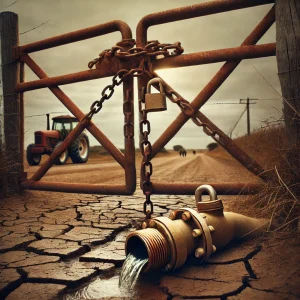Rases Questions about Justice
Reporter – George April
HOPEFIELD:- A farm eviction case that has spanned several years continues to spark debate, with many questioning whether justice was truly served.
The case began when a farmer attempted to remove a family from his property, after cutting off their water and electricity supply. The matter was taken to the lower court, where the farmer lost and was ordered to restore the family’s access to basic services. However, he never complied with the ruling and instead escalated the case to the high court.
High Court Ruling Ignored
Once again, the high court ruled against the farmer, instructing him to restore the water and electricity supply. Despite the ruling, the farmer refused to comply, and repeated attempts to seek police intervention were ignored. In the meantime, the farmer lodged multiple cases against the family members, forcing them into prolonged legal battles. Most of these cases were eventually dismissed.
Lower Court Grants Eviction Order Despite Prior Rulings
Years later, the situation shifted when the farmer reapplied for an eviction order in the lower court. Despite the previous rulings from the high court, the lower court granted the eviction order, leading to widespread concern about the legality of the decision. A Human Rights commissioner and labor rights workers, publicly stated that the eviction was unlawful.
What Does the Law Say About Farm Evictions?
South Africa’s Constitution and laws provide clear protections for people living on farms, particularly under:
1. The Extension of Security of Tenure Act (ESTA, 1997)
ESTA protects farm dwellers who were already living on a farm when the land was bought.
It states that long-term farm residents cannot be evicted without due legal process.
If a person has lived on a farm for more than 10 years and is over 60 years old or disabled, they cannot be evicted.
2. Constitutional Protection (Bill of Rights, Section 26 &b25)
Section 26(3): No one may be evicted from their home without an order of court made after considering all circumstances.
Section 25: Protects property rights, but also states that occupiers have rights, especially vulnerable individuals.
3. High Court vs Lower Court Issue
The High Court ruling against the farmer should have been final unless properly appealed.
If the lower court ruled differently, it raises concerns about whether due process was followed.
Evictions in Matzikama and Hopefield
This is not an isolated case. Reports indicate that farmers in the Matzikama Municipality district have evicted several families under questionable legal circumstances. Many affected families struggle to obtain legal representation, as legal aid lawyers require approval before taking on cases. A lawyer representing a Hopefield family confirmed that he could not act without permission from the Legal Aid Board, leaving the family in legal limbo.
A Broken System – Lack of Support for Farm Workers
Farm unions and government bodies meant to protect farm workers appear ineffective. Instead of assisting vulnerable families, these organizations remain silent while evictions continue. If farm workers had stronger legal and institutional support, these conflicts could be avoided, and South Africa might see fewer farm-related murders.
Why Are These Laws Ignored?
Many farm evictions, like this case, seem unlawful because:
Landowners use legal loopholes to remove families.
Police often refuse to intervene, even when evictions are illegal.
Some magistrates in lower courts ignore higher court rulings.
Do We Have a Constitution?
Yes, but the biggest issue is enforcement. If the courts and police ignore constitutional rights, then justice becomes selective. Many South Africans experience what this family faced—court rulings that mean nothing and police that don’t act. This raises an important question: Is justice only for those who can afford it?
Calling on Legal Experts to Respond
The fundamental issue remains: If a high court decision can be bypassed without consequence, what does that mean for the integrity of the justice system? The answers to these questions remain unclear, but for those affected by such rulings, the impact is deeply felt.
We invite legal experts, human rights activists, or anyone with legal knowledge to weigh in on this matter. If you have insights into why the high court ruling was ignored, or how farm evictions should be handled under South African law, we welcome your response. Justice should not be selective—your voice matters.
